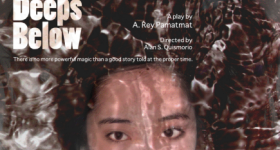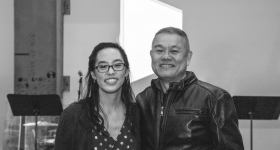Photographer Gregory Costanzo
RIDING A MOTORCYCLE on a steel high wire, leading workshops with Serbian and Albanian children, and performing his one-man show on the Cultural Revolution, Rob Lok is igniting his own revolution in the art of clowning.
Lok is a buffoon by trade, but he's not just out to crack a few laughs or scare small children at the circus or birthday parties. As director of the newly-relaunched Ringling Brothers and Barnum & Bailey Clown College, he leads a program that teaches the requisites in clowning education, from juggling and acrobatics to the history of clowning and character development.
"Circus clowning is much more than tying balloons and honking noses," Lok says. "It can be anything from dropping your pants to something beautiful and melodic like the snowfall scene in Slave's Snowshow that makes people cry."
"My approach is, how can you make it accessible, show pain, energy, humor all together? The only way to get there is by being completely honest. It truly is a complex, diverse art form, placed well for a day and age so full of absurdity, tragedy, joy, intense emotion."
And sometimes clowning can get downright political. Working with the New York-based Bond Street Theatre's community outreach programs in Serbia, Lok supported an attempt to heal the rift between Romanian, Serbian and Albanian children through circus and clowning communication.
"We taught them communication through circus skills and a non-competitive atmosphere. Different ethnic groups developed shows that illustrated their issues. There was opposition to working together and bickering, but I believe it really created a cycle that keeps going," Lok says.
IF JACKIE CHAN WERE A CLOWN
While traveling abroad with the Bond Street group, Lok often ventured into areas where there weren't many Asian people and received double takes for being Asian as well as being a clown. In some areas, the only exposure people had to Asians was through the media and television.
"Even in corners of Afghanistan, people knew who Jackie Chan was. In this land of camels, this kid looks at me and all he could say in English was 'Jackie Chan,'" Lok recalls. "In Romania and Serbia it was always, 'Jackie Chan! Jackie Chan!' So I'd just give up and say, 'That's who I am, man, that's who I am.' I gave people my autograph. I was just totally happy that there was this opportunity to go out there and do outreach workshops in at-risk areas."
"The title Chinese American clown was thrown on me and I have used it to my advantage, but first and foremost, I am a performer," Lok says. "I'm not really breaking any barriers, but I'm very proud to be Asian American and have these roles."
But Lok's solo show about the Cultural Revolution, called Revolutionary Chickens, which he wrote, produced and performed in, revealed a very politically-bent and personal approach, modeled on his parents' experience in a brutal regime.
"Right now, our lives are starting to parallel my parents' story, whether you're in the US or China. Big Brother is watching us, and now he has so many more tools to do it with," Lok says. So he's playing his part in educating the MTV and Internet generations to prevent history from repeating itself. "We need art to teach us the history of oppression so we can begin to fight it," he says.
A LIFE IN "EDUTAINMENT"
This year, Lok was chosen to spearhead the relaunch of the Barnum & Bailey Clown College after its closure in 1997, when the group decided to change its focus.
Now, as director, Lok is charged with coordinating academic programming, including making decisions about curriculum and methods of teaching. He also teaches clowning to the children coming in to visit Wannado City, the Florida amusement park that houses the Clown College.
"Wannado City preaches a philosophy of 'edutainment,'" Lok says. "Visitors can be whatever they want to be there, a firefighter, a musician, even a clown," a philosophy Lok himself could have used growing up.
Lok was born and raised in New York's Chinatown until being transplanted to Arlington, TX, which was "hell for a 15-year-old Chinese kid." In Arlington, Lok ran with a rebellious crowd, neglected his studies and eventually got kicked out of his parents' house.
One day, he found a report card that his fifth grade teacher had written which said that he had a lot of potential that he was not fulfilling. Lok had a revelation.
"I thought, there's nothing going on with my life right now. I haven't progressed much from that point. I was nothing. I couldn't have that."
Soon thereafter, Lok saw an advertisement for Clown College auditions. "I saw it and thought why the hell not," he recalls. He was one of a handful selected from a pool of 3,000 people. "Between 20 and 30 are accepted, so getting in is harder than getting into Harvard," Lok says.
In 1996, Lok graduated from the Ringling Brothers and Barnum & Bailey Clown College with an official Bachelor of Buffoonery degree and became the first Chinese American clown to perform with the Ringling Brothers and Barnum & Bailey Circus.
Dakota Kim is a Brooklyn-based freelance writer whose work has appeared in McSweeney's, Block Magazine and The Feminist Review. In her spare time, she works for the Bindlestiff Cirkus and OhMyRockness.com.









Comments